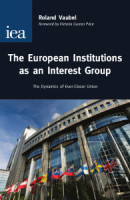 Roland Vaubel
Roland Vaubel
The institutions of the European Union are gaining more and more power at the expense of national and local governments, as well as individuals and private businesses. There would appear to be no reverse gear in this process, while objections from the general public, as expressed in periodic referenda, tend to be brushed aside.
This groundbreaking study explains increasing centralisation by analysing the economic incentives at work. The structure of European institutions means they have a vested interest in evercloser union because this enhances their influence and prestige. Moreover, the bureaucrats themselves are self-selecting. Those that are pro-EU are more likely to seek positions in these organisations and therefore tend to favour policies which give the institutions more responsibilities.
The author sets out a series of reforms designed to counteract the centralising tendency and to ensure that the role of EU bodies is more closely aligned with the preferences of citizens.

